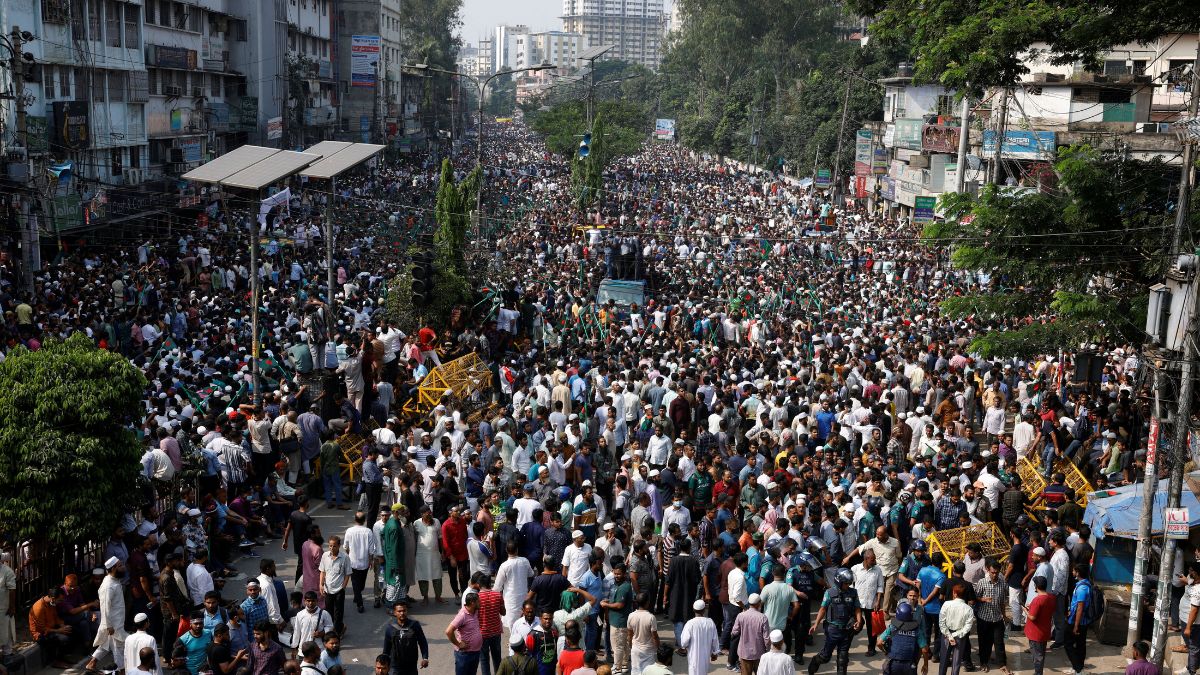Bangladesh is facing a political crisis of unprecedented proportions, resulting in the ousting of Prime Minister Sheikh Hasina. This turmoil, marked by weeks-long protests, has been significantly influenced by Jamaat-e-Islami, a prominent Islamist organisation with deep historical and political roots in the region.
Jamaat-e-Islami was founded in 1975, evolving from an orthodox Islamic movement in erstwhile East Pakistan. Its mission, as articulated by its founder Sayyid Abul A’la Maududi, a figure associated with the Muslim Brotherhood, is to establish an Islamic state.
The name Jamaat-e-Islami translates to “congregation of Islam,” and the organisation has consistently promoted the idea of Islamic rule globally.
Watch:
Over the years, Jamaat-e-Islami became the largest Islamic political party in Bangladesh, known for its alliance with the Bangladesh Nationalist Party (BNP) led by Khaleda Zia.
However, its political participation was curtailed in 2013 when the Bangladesh government banned it from contesting elections, citing its constitution’s opposition to secularism, a key tenet of the national constitution.
A controversial history
Jamaat-e-Islami has a controversial history dating back to Bangladesh’s liberation war in 1971. The organisation’s members formed auxiliary forces like Razakars, Al-Badr, Al-Shams, and the Peace Committee, which were implicated in atrocities against Bengali freedom fighters and members of the Hindu community.
These actions led to the organisation’s initial ban by Sheikh Mujibur Rahman, the country’s founding father.
Despite this, Jamaat-e-Islami maintained a significant presence in Bangladesh’s political landscape. After the assassination of Sheikh Mujibur Rahman and the subsequent military coup in 1975, the ban was lifted, and the organisation re-emerged as Jamaat-e-Islami Bangladesh.
Impact Shorts
More ShortsIt aimed to create an “Islamic state” governed by Sharia law, interpreting its central political concept “Iqamat-e-Deen” as the establishment of an Islamic state through state power.
The brief fall of Jamaat-e-Islami in Bangladesh
The fall of Jamaat-e-Islami began with the War Crimes Tribunal initiated by the Awami League government in 2008. Many top leaders of Jamaat, who were involved with the Pakistani Army during the 1971 liberation war, were convicted of war crimes.
This led to major strikes and protests by Jamaat, resulting in more than 60 deaths and widespread destruction of public property.
The International Crimes Tribunal charged several Jamaat leaders with crimes against humanity. Delwar Hossain Sayeedi, a deputy leader of Jamaat, was sentenced to death for genocide, rape, and religious persecution.
Muhammad Kamaruzzaman was convicted of mass killings, rape, torture, and kidnapping. Ghulam Azam, former ameer of Jamaat, was sentenced to 90 years’ imprisonment for incitement, conspiracy, and failure to prevent murder. Ali Ahsan Mohammad Mojaheed was sentenced to death for his crimes during the war.
What is the political influence of Jamaat-e-Islami?
In the 1980s, Jamaat joined the multi-party alliance for democracy restoration and later allied with BNP. Jamaat leaders held ministerial positions in BNP-led governments from 1991 to 1996 and from 2001 to 2006.
Interestingly, the Awami League, led by Sheikh Hasina, also formed an alliance with Jamaat in 1996 to secure power. In 2008, Jamaat won two out of 300 seats in the Parliament.
The organisation’s influence extends beyond Bangladesh. In Pakistan, Jamaat-e-Islami remains a significant political force despite its militant activities through its student wing, Islami Jamiat-e-Talaba.
It has connections with various militant groups, including Hamas, Palestinian Islamic Jihad, and the Muslim Brotherhood. In Europe and the US, Jamaat has established networks through South Asian immigrant communities, particularly active in the UK.
What was Jamaat-e-Islami’s role in the recent unrest?
The recent political upheaval in Bangladesh began with anti-quota protests, which escalated into anti-Hasina demonstrations. These protests, initially focused on the controversial government job quota system, turned violent and widespread, leading to over 400 deaths and thousands of injuries.
Reports suggest that Jamaat-e-Islami and its student wing, Chhatra Shibir, played a significant role in instigating these protests.
“Islami Chatra Shibir cadres were admitted to many universities in Bangladesh from where they instigated students against the government,” according to an India Today report.
The main centres of Islami Chhatra Shibir include Dhaka University, Chittagong University, Jahangir University, Sylhet University, and Rajshahi University.
How has the government responded to Jamaat-e-Islami?
In response to the escalating violence, Sheikh Hasina’s government declared Jamaat-e-Islami and Chhatra Shibir as terrorist organisations under Section 18/1 of the Anti-Terrorism Act of 2009.
Law enforcement agencies launched a crackdown on Jamaat and its affiliates, targeting offices and publication houses associated with the group. Despite these efforts, reports indicate that Jamaat activists continue to mobilise and stage protests in various regions.
The government has taken decisive actions to curb Jamaat’s influence. “Sheikh Hasina’s government accused the party of instigating violent protests over the last couple of months over the government job quota system,” an official statement read.
This crackdown has intensified following the court ruling in 2013, which cancelled Jamaat’s registration, a decision upheld by the Supreme Court’s Appellate Division in 2023.
It was fully banned by Dhaka on August 1, 2024.
Does Jamaat-e-Islami have any global influence?
Jamaat-e-Islami’s influence is not confined to Bangladesh. In Pakistan, it remains a major political force, despite its involvement in militant activities.
The organisation has established connections with militant groups such as Hamas, Palestinian Islamic Jihad, and the Muslim Brotherhood. These connections have facilitated Jamaat’s activities and ideological propagation across borders.
In Europe and the US, Jamaat has leveraged South Asian immigrant communities to establish a network of influence. The organisation is particularly active in the UK, where it has a significant impact on Islamic organisations and community politics.
Washington has also been a strong advocate for Jamaat’s political participation, often urging Bangladesh to lift restrictions on the group.
What was Hasina’s stance on Jamaat-e-Islami?
Sheikh Hasina has been regarded as a progressive and secular leader who prioritised economic upliftment and secular governance. Her stance is what reportedly made her a target for radical Islamists, including Jamaat-e-Islami.
Despite the challenges, Hasina had remained steadfast in her efforts to curb the influence of extremist groups and promote secularism in Bangladesh.
Also Watch:
With inputs from agencies


)

)
)
)
)
)
)
)
)



